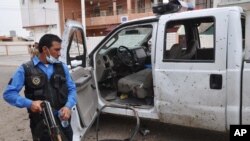U.N. Secretary-General Ban Ki-moon has condemned violent attacks in Iraq targeting political leaders and candidates, as the country holds its first election since the withdrawal of U.S. troops in late 2011.
In a statement late Monday, Ban urged Iraqi leaders to make sure everyone is able to take part in the political process.
He also praised Iraq's election commission for holding the elections on time, and called the vote "an important milestone in Iraq's democratic transition."
Early voting began Monday for those unable to cast their ballot in Wednesday's parliamentary election.
At least 50 people died Monday when a series of suicide bombings struck polling centers around Baghdad and north of the city, while roadside bombs targeted military and police convoys.
In the deadliest attack, a suicide bomber detonated an explosive at a Kurdish political gathering in the town of Khanaqin, northeast of the capital, killing 30 people and leaving more than 50 others wounded. The group was watching video of ailing Iraqi President Jalal Talabani cast his vote in Germany, where he has been undergoing medical treatment.
No one has claimed responsibility for the attacks, but Sunni militant groups have previously targeted security forces and members of the nation's Shi'ite majority.
Analysts say voters will likely cast ballots along sectarian and ethnic lines with no single party expected to win a majority.
In a statement late Monday, Ban urged Iraqi leaders to make sure everyone is able to take part in the political process.
He also praised Iraq's election commission for holding the elections on time, and called the vote "an important milestone in Iraq's democratic transition."
Early voting began Monday for those unable to cast their ballot in Wednesday's parliamentary election.
At least 50 people died Monday when a series of suicide bombings struck polling centers around Baghdad and north of the city, while roadside bombs targeted military and police convoys.
In the deadliest attack, a suicide bomber detonated an explosive at a Kurdish political gathering in the town of Khanaqin, northeast of the capital, killing 30 people and leaving more than 50 others wounded. The group was watching video of ailing Iraqi President Jalal Talabani cast his vote in Germany, where he has been undergoing medical treatment.
No one has claimed responsibility for the attacks, but Sunni militant groups have previously targeted security forces and members of the nation's Shi'ite majority.
Analysts say voters will likely cast ballots along sectarian and ethnic lines with no single party expected to win a majority.





